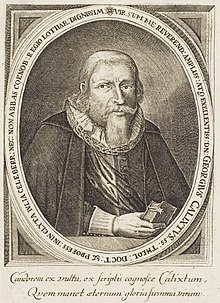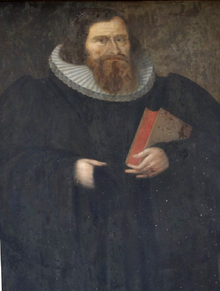Johann II. Mühlmann
Johann Mülmann SJ (also Mühlmann ; * May 12, 1600 probably in Naumburg ; † February 10, 1651 in Hadamar ) was a German Roman Catholic theologian , father in the Jesuit college in Münster and confessor of Prince Johann Ludwig von Nassau-Hadamar at the time of the Westphalian Peace .
Life
Mühlmann was probably born in Naumburg, where his father worked as a pastor, grew up in Leipzig, where his father Johann Mühlmann worked as a pastor and (after an interlude in Laucha an der Unstrut ) from 1607 as a professor. On November 2, 1607, his mother Dorothea died of the plague; In 1608 the father married again, but died in 1613, so that Mühlmann became an orphan at the age of only 13. Both sons from the first marriage became Catholics. Mühlmann studied in Cologne, where he converted and joined the Society of Jesus in 1620 . His brother Hieronymus tried to win him back to the Protestant denomination in Cologne, but entered the Jesuit order himself in 1627. Mühlmann was a priest in the Jesuit college in Münster . He had a good knowledge of Italian, French and Spanish, taught philosophy and theology for a few years and finally became confessor of Prince Johann Ludwig von Nassau-Hadamar , who had converted himself . The Jesuits were in correspondence with their friars in the capitals of Europe, and especially with the emperor's confessor in Vienna, and thereby sought to influence the decisions of the courts. It is known how the imperial envoy at the negotiations of the Peace of Westphalia, the then Freiherr von und zu Trauttmansdorff and from 1635 imperial count Maximilian von und zu Trauttmansdorff-Weinsberg, was a thorn in their side because, in their opinion, he allowed the Protestants too much, like they tried to remove him from Munster, and how in the last years of the negotiations they tried to delay the conclusion of the peace because not all the conditions met their expectations. When Trauttmansdorff had resolved the main problem through the adoption of the year 1624, which was finally agreed with the Evangelicals, as the normal year that was decisive for the state of religion and the possession of church property in a country or town, the Jesuits and the other peacemakers at Münster got into such anger, that they set heaven and hell in motion to Ferdinand III. to be able to recall the count. Johannes Schücking SJ (pseudonym: Dr. Rudolph Battermann) (* 1596 in Darfeld ; † 1660), who joined the Society of Jesus in 1617, had directed all of its enterprises and all letters that the individual Jesuits wrote or received passed through his hands. In Mühlmann and Coeler's letter to Ferdinand III. Confessor, Father Johann Gans SJ (* 1591 in Würzburg; † 1662) from July 12, 1647, Trauttmansdorff is derisively called "Aesculapius". The letter was intercepted by the Swedes and published immediately. It was reported to Gans that all efforts to touch Trauttmansdorff's conscience remained fruitless, as nothing could shake him in his sinful resolution to bring about the work of peace by giving in to the religious question. The grants already granted to the heretics are so nefarious, so horrible that even the urge of the utmost necessity cannot excuse them. It was therefore high time that the emperor's confessor tried to recall Trauttmandorff, persuaded him to continue the war and to keep him from all concessions against the Protestants. The letter is as follows:
Reverend in Christ pater!
Pax ejusdem!
Scripseram Reverendae Vestrae Dignitati ante triduum, certo statuisse Aesculapium, in viam hodie se dare, et jam fidem apud omnes invenerat, nam jam vale dixeratlegatis omnibus, imo etiam heri mane Reverendo Patri Rectori nostro an, sed et una hora aliquamdiu statuit, nimirum, quia Protestates novam illi spem injecere, ut hominem tam sibi charum teneant. Quid videtur Reverentiae Vestrae? Now res ridicula est? Mitto Reverentiae Vestrae novum quoddam scriptum Vehiculum etc. dignum est lectu. Sed estne inter vos aliquis, qui posthac talia Caesari legenda offerre audeat? Incumbit hoc onus Reverentiae Vestrae, ut conscientiae ipsius consultur. Ne quaeso blandimini vobis de extrema necessitate, nulla tanta esse potest, ut quaedam, quae in Projecto Instrumenti Pacis admittuntur, excusentur. Ostendit Deus in Belgio; ostendit in Catalonia, quam bene cupiat Domui Austriacae; in ipso confidite, et Dei causa et Ecclesiae agite. Audiveritis haud dubie, solatum obsidionem Leridanam: Principem Condaeum in capite saucium profugisse Balaguerium: isthic nunc obsideri from Hispanis. Demittunt hic nonnihil capita sua Franci. Widenbrugium strenue se defendit contra Königsmarckium; perdit is in oppugnatione ista multos milites; vi jam aliquoties facto impetus urbem oecupare conatus est, sed repulsus semper cum clade. Commendan's insignem laudem meretur. Adventare nunc dicuntur copiae quaedam auxiliaries Lotharingicae, et in propinquo esse; id si verum est, solvetur, spero, obsidio. A Caesare victoriam indies expectamus, imo jam a quibusdam spargitur, pugnatum ad Egram, Caesarem Victorem esse; Melandrum occubuisse: Ego nondum credere sum ausus. Reverentiae Vestrae sacris et precibus me commendo, Monasterii. July 12, 1647.
Reverentiae Vestrae
Servus in Christo
Johannes Mulmann
P.SJ
PS Aesculapius, tametsi conscientiam ipsi moverim, pergit quotidie, novis largitionibus pacem eblandiri: remittent illi aliquid in uno alterove puncto; sed in substantialibus nihil. Quaeso Reverentia Vestra scribat mihi mentem et sensusm Caesaris de Projecto Pacis.
God. Coeler
P.SJ
Mühlmann is known for his works Dispp. de fide, quaenam inter tot religiones hoc seculo sola tuto recipi possit , De calice eucharistico , De purgatorio and for the translation in 1649 from Spanish into Latin by Diego de Saavedra Fajardos Emblemática , printed in Brussels. Mühlmann exchanged pamphlets with the Protestant theologian Georg Calixt in Helmstedt and other Lutheran theologians.
family
Mühlmann's parents were the Leipzig Archdeacon of the Nikolaikirche Johannes Mühlmann (1573-1613), married in September 1599 to Dorothea Gleser (baptized December 10, 1579 in Pegau, † November 2, 1607 at the Pest in Leipzig). Mühlmann's uncle Christian Mühlmann (* 1582 in Wiederau; † 1642 in Pegau) had been a deacon since 1609 and archdeacon in Pegau since 1626. Mühlmann's siblings were:
- Magdalena Mühlmann (* around 1600 in Pegau; † November 16, 1633 in Borna ), as the widow of Jacob Lossius (born June 22, 1596 in Dippoldiswalde ; † January 28, 1663 in Borna), philosopher, pastor and superintendent in Borna.
- Hieronymus II. Mühlmann SJ (baptized February 23, 1606 in Leipzig, † October 22, 1666 in Copenhagen ), Catholic rector and missionary in Denmark.
- Maria Mühlmann (emergency baptism at home October 30, 1607 in Leipzig; † November 2, 1607 in Leipzig).
and the half siblings: -
- Paul Mühlmann (baptized October 17, 1609 in Leipzig; † 1642 in Weißenfels), Magister ( University of Breslau ) studied with Poeta laureatus Paul Fleming in Breslau , dedicated a poem to him in 1632 "De rautato magistrorum creationis tempore" ; 1636–1642 pastor in Reichardtswerbe , then in Weißenfels.
- Christian II. Mühlmann (born February 11, 1611 in Leipzig, † September 13, 1660 in Lützschena ), (twin) Magister, pastor in Lützschena and Hänichen near Leipzig, father of Christian III. Mühlmann (* around 1640), died in Rome as papal secretary; and Johann III. Mühlmann (born November 5, 1642 in Leipzig; † April 24, 1715), antiquarian and historian .
- Maria Mühlmann (born February 11, 1611 in Leipzig) (twin)
- Susanna Mühlmann (baptized July 15, 1612 in Leipzig), married since 1635 to Joachim Pollio (born April 7, 1602 in Bunzlau in Silesia; † June 3, 1656 in Breslau ), archdeacon in Breslau.
- Gertrautte Mühlmann (baptized December 29, 1613 in Leipzig).
Works
- Dispp. de fide, quaenam inter tot religiones hoc seculo sola tuto recipi possit
- De Calice Eucharistico contra eundem. (Muenster)
- De Missis privatis contra Calixtum Calvinistam. Monasterii Westphaliae typis Bern. Raesfeldii 1647 in 4. (Münster, April 1647)
- De libris Machabaeorum contra Scheiblerum. Ibidem 1648 in 8. (Münster, August 1648)
- De purgatorio contra Calixtum et Sectarios. Ibidem 1648 in 8. (Münster, August 1648)
- Translation from Spanish into Latin by Diego de Saavedra Fajardos Emblemática
literature
- Christian Gottlieb Jöcher : General scholarly lexicon. Third part MR. Johann Friedrich Gleditsch, Leipzig 1751, p. 745.
- Johann Christoph Harenberg: Pragmatic history of the order of the Jesuits, since their ... , Volume 2.
- Mülmann, Johann a Jesuit. In: Johann Heinrich Zedler : Large complete universal lexicon of all sciences and arts . Volume 22, Leipzig 1739, column 170 f.
- Bernhard Sökeland : History of the Munster high school from the transition of the same to the Jesuits in the years 1588 to 1630, by B. Sökeland, senior teacher. Münster, printed with Coppenrath writings, Volume 1, p. 94 et al.
Web links
Individual evidence
- ↑ No baptism entry in Leipzig. At that time the parents lived in Naumburg.
- ^ Würzburg Diocesan History Sheets , Volume 43, Diocese of Würzburg, 1981, p. 85
- ^ Würzburg Diocesan History Sheets , Volume 43, Diocese of Würzburg, 1981, p. 85
- ↑ Christian Gottlieb Jöcher : General learned lexicon. Third part MR. Johann Friedrich Gleditsch, Leipzig, 1751, p. 745.
- ↑ Mülmann, Johann a Jesuit. In: Johann Heinrich Zedler : Large complete universal lexicon of all sciences and arts . Volume 22, Leipzig 1739, column 170 f.
- ^ History of the Jesuits in Germany up to the abolition of the order by Pope Clement XIV. (1540–1773) by Samuel Sugenheim, Volume II., Frankfurt am Main, Literary Institution (J. Rütten), 1847.
- ↑ History of the Münster high school from its transfer to the Jesuits in the years 1588 to 1630, by B. Sökeland, senior teacher. Münster, printed with Coppenrath writings, Volume 1, p. 94 et al.
- ↑ Funeral Sermon From the state of human life / except the 14th Cap. Jobs: At the funeral of the mercy seeds of virtue Frawen DOROTHEA, Hern M. Johan: Mülmans Archidiaconi of the churches to S Niclas in Leipzig / and the H. Schrifft there professoris, beloved blessed house = frawen / Which November 2nd: Anno 1607 in God blissfully asleep / and following the 4th of the same Christian wise buried on earth. Held by Vincentium Schmuck D. pastors and professors there.
- ↑ Hieronymus, St. Nikolai Taufbuch 1606 p. 3, father: Magister Johann Mülman, deacon of Nikolai, mother: Dorothea
- ^ General scholarly lexicon: Third Part MR, by Christian Gottlieb Jöcher, Leipzig, 1751, pp. 744 & 745.
- ^ Paulus, baptized October 17, 1609 (St. Nikolai, Taufbuch, 1609 p. 18). Father: Magister Johann Mühlmann, mother: Gertrud.
- ^ Paul Fleming's German poems, by Johann Martin Lappenberg Stuttgart. Literary Association. 1865.
- ^ General scholarly lexicon: Third Part MR, by Christian Gottlieb Jöcher, Leipzig, 1751, pp. 744 & 745.
- ↑ Christianus, baptized February 11, 1611, St. Nikolai, Taufbuch 1611 p. 52, father: Magister Johann Mülmann, mother: Gerdr (aut). Twin of Maria.
- ^ General scholarly lexicon: Third Part MR, by Christian Gottlieb Jöcher, Leipzig, 1751, pp. 744 & 745.
- ^ Maria, baptized February 11, 1611, St. Nikolai, Taufbuch 1611 p. 52, father: Magister Johann Mülmann, mother: Gerdr (aut). Twin of Christianus.
- ↑ Susanna, baptized July 15, 1612, St. Nikolai, baptism book 1612 p. 94, father: Magister Johan Mülmhan, deacon of St. Niclas. Mother: Married.
- ↑ Gertrautte, baptized December 29, 1613, St. Nikolai, Taufbuch 1613 p. 147. Father: Licentiat Johann Mülmhan, deacon of St. Niclas who was resting in God, mother: Gertrautte.
| personal data | |
|---|---|
| SURNAME | Mühlmann, Johann II. |
| ALTERNATIVE NAMES | Mülmann, Johann |
| BRIEF DESCRIPTION | German Jesuit, teacher, confessor of Prince Johann Ludwig von Nassau-Hadamar |
| DATE OF BIRTH | May 12, 1600 |
| PLACE OF BIRTH | uncertain: Naumburg |
| DATE OF DEATH | February 10, 1651 |
| Place of death | Hadamar |




